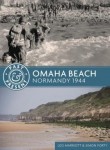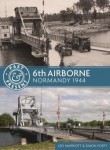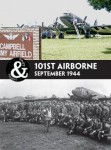Thursday, November 17, 2016 - 01:43 PM UTC
Casemate UK presents a new series of books which pairs wartime and modern photography to explore the operations of a combat unit, a campaign or battle.
The brand new Past & Present series reconstructs historical battles by using photography, juxtaposing modern views with those of the past. It shows how much of the infrastructure has remained and points to the passing nature of things – such as outfits, uniforms and ephemera.
These books present a coherent link between now and then, linking the monuments and battlefield relics with what actually happened.
At this moment the titles available are:
These books present a coherent link between now and then, linking the monuments and battlefield relics with what actually happened.
At this moment the titles available are:
- Omaha Beach, Normandy 1944. Of the five beaches attacked on 6 June, Omaha saw the sternest fighting. Well-placed defenders on the high ground and extensive beach defences did their job. There were 32 fortified areas located between the Vire River and Port-en-Bessin: in all, 12 of these strongpoints were able to direct fire on Omaha Beach. The attacking forces-units of the US 29th and 1st Inf Divs suffered over 2,000 casualties
- Bastogne, Ardennes 1944. Bastogne will live forever in the annals of American military history. The defense of Bastogne and victory in the Ardennes was one of the greatest feats of American arms in the European Theatre.
This title in the Past & Present series looks at the encirclement, siege, and relief with then and now photographs; specially commissioned aerial photos, and a wealth of detail. - 6th Airborne, Normandy 1944. 6th Airborne Division—which included 1st Canadian Para Bn-had been allotted three specific tasks to achieve, apart from protecting the eastern flank of the Allied seaborne landings. First, it was to capture intact the two bridges over the Caen Canal and the Orne River at Benouville and Ranville. Second, the division was to destroy the heavily fortified Merville coastal artillery battery located at Franceville Plage, to ensure that it could not shell the British forces landing on Sword Beach. A third task was to destroy several bridges spanning the River Dives-at Varaville, Robehomme, Bures, and Troarn. The division would then hold the territory that it had seized until it could be relieved by advancing Allied ground forces.
- 101st Airborne, Market Garden 1944. Operation 'Market Garden' is a strongly debated subject among WW2 historians: was it a brave attempt to end the war early that foundered for being a bridge too far, or was it, rather, an ill-conceived waste of resources that should have been used on another front? With hindsight, there's no doubt that the operation was a daring-if not risky-attempt to attack deep into enemy territory proposed by a general often disparaged for being too conservative.
Click Star to Rate
3 readers have rated this story.
THIS STORY HAS BEEN READ 5,868 TIMES.
| Casemate Publishing Reviews | MORE |
| US Army Vehicle Markings 1944 by Darren Baker | |
| Allied Armour in Normandy by Darren Baker | |
| Operation Typhoon by Darren Baker | |
| Blood and Bandages by Darren Baker | |
| Tanks in Hell by Bill Cross | of 2 ratings, 100% found this helpful | |
| The Old Front Line by Darren Baker | |
| The Ardennes 1944-1945 by Darren Baker | |
| The Lions of Carentan by Rick Cooper | of 1 ratings, 100% found this helpful | |
| The Roer River Battles by Randy L Harvey | of 1 ratings, 100% found this helpful | |
| Panzertales Collector Book by Charles Reading | of 5 ratings, 100% found this helpful | |
| A Magnificent Disaster by Bill Plunk | of 9 ratings, 100% found this helpful | |
| Realistic Model Buildings by Scott Lodder | of 3 ratings, 100% found this helpful | |
| Modelling German Armor by Henk Meerdink | of 6 ratings, 100% found this helpful | |
| Terrain Modeling by Scott Lodder | of 7 ratings, 100% found this helpful | |
| Armor Finishing Techniques by James Bella | of 19 ratings, 100% found this helpful | |












Comments